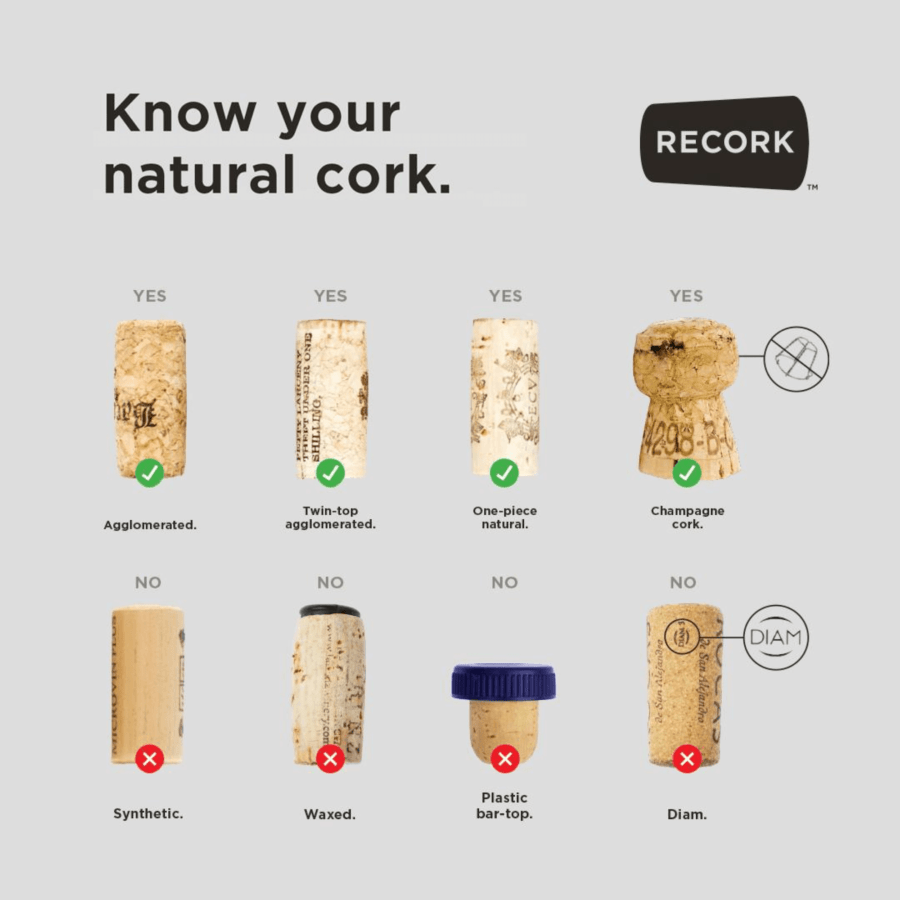Put a Cork In It: Everything You Need to Know About Popping Bottles + Recycling Cork Closures
Cork is an ecological and sustainable material.
It is 100% natural, renewable, recyclable and reusable.
What are the different types of cork found in wine bottles?
There are nine different types of cork closures: natural cork stoppers, colmated natural cork stoppers, champagne and sparkling wine cork stoppers, technical cork stoppers, micro-granulated cork stoppers, agglomerated cork stoppers, and capsulated cork stoppers.

Which type of cork is best for the environment?
Natural cork is best for the environment. It is harvested from the bark of cork oak (an evergreen tree predominantly found in Portugal) every 9-12 years. Harvesting cork is a skilled process, as the tree is not cut down or harmed during harvest and will occur 15-18 times in a trees lifetime with each tree living 200+ years.
It is only after the 3rd harvest – 43 years – that the cork has achieved the standards of quality required for a natural cork stopper used for wine.
Cork harvesting is one of the best paid agricultural jobs anywhere in the world, helping to keep rural communities together, and attached to the land where they have live for generations.
What are the benefits of cork trees?
Cork oak trees can absorb 20 tons of CO2 from the atmosphere in their lifetime and can create a biodiversity hot spot. These hotspots can retain 14,000,000 tons of CO2 per year, and provides a safe environment to many species because cork trees act as a natural fire barrier, unaffected by desertification.
In addition to each cork tree absorbing 20 tons of carbon in its lifetime, they will produce up to 65,000 corks, each of which will retain approximately 309 to 589 grams of CO2. Every year, cork oak forests absorb as much CO2 as driving 1.5 million cars all year would produce.
Cork vs. Other Closures
Being a natural product, the net effect of producing 1000 natural wine corks is that you remove around 250 pounds of CO2 from the atmosphere, making it the most sustainable closure for eco-conscious wine drinkers.
Compared to others, plastic closures take 9 times more greenhouse gas emissions to produce, while aluminum screw caps take 24 times the emissions to produce than natural cork. Both Aluminum and plastic closures take four times the non-renewable energy to produce, compared to natural cork stoppers.
What is 100% Cork?
100% Cork is an educational communications campaign about wine cork stoppers. The mission of the campaign is to provide the wine industry and consumers with the latest information and research on the benefits of natural cork. The campaign was established by the Portuguese Cork Association (APCOR) with support from the Cork Quality Council to increase awareness of the unique qualities and sustainability of natural cork.
What is APCOR?
APCOR, also known as The Portuguese Cork Association, represents, promotes, divulges, and carries out research in the Portugues cork industry. Their goal is to promote and educate the value of cork as a raw material that can be recycled into excellent products.
What is ReCork?
ReCork receives recycled cork materials from APCOR and creates high-performance, carbon-negative materials and components using natural recycled cork. ReCork’s goal is to replace products that have harmful petroleum-based foams and plastic with cork.
What are the steps of cork recycling?
- Cork oak trees grow and absorb CO2 from the atmosphere.
- Cork oak bark is harvested from each tree every nine years without cutting or harming the tree.
- Wine Corks are carved out from the bark, while trimmings are saved and grounded into a post-industrial recycled material.
- Wine corks are used as stoppers.
- After corks are used, ReCork collects and grinds the corks into a post-consumer recycled material.
- Post-industrial and post-consumer recycled trimmings are combined to create post-industrial recycled cork.
- Post-industrial recycled cork materials are turned into products like footwear, bulletin boards, coasters, and more.
Stay up to date on all things awesome!



1 Comment